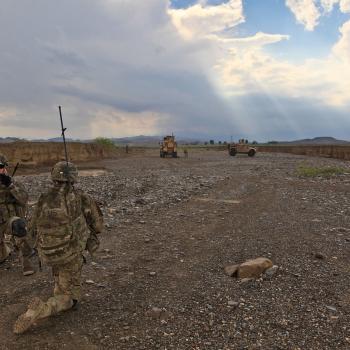 Monday: Read John 1:1-18
Monday: Read John 1:1-18
The Gospel of John begins with a clear allusion to the book of Genesis: “In the beginning” (1). One of John’s goals is to identify the Word (Jesus) with the Creator. Thus, “all things came into being through Him” (3). We know that John is talking about Jesus in 1:1-3 because he makes it clear in 1:14 that, “the Word became flesh.”
John explicitly affirms the Word’s identity with the Father: “the Word was with God, and the Word was God” (1). The Word is not the Father—after all, He could not be “with God” (i.e., the Father) and be the Father at the same time.
John 1:1-3 establishes the eternality of the Word, the Word’s identity with God, and the distinctiveness of the Word from the Father. In 1:14-18, John makes it clear that the Word of whom he has been speaking, is none other than Jesus. Thus, we conclude that Jesus is a person distinct from God the Father and, yet, equal with God the Father in nature and being.
Despite the fact that Jesus is the creator (10) and the source of Light (9), He was still rejected (10-11). But, John affirms, those who did receive Him, those who believe in His Name, became “children of God” (12). This, John says, is the purpose for which he wrote (20:31).
If Genesis were the key to unlocking John 1:1-5, the book of Exodus is the key to unlocking John 1:14-18. In Exodus, God appears to Moses and the Israelites. Yet, he does so in only a shrouded way. God was a pillar of fire by night and a cloud by day. Even when Moses was permitted to see God, it was from a cave, lest Moses see God’s face and perish (Exod 33:20-23). For, God says, “no man can see Me and live!” (Exod 33:20).
Now, John says, things are different. Of Jesus, John affirms, “we saw His glory” (1:14). In Jesus, the eternal God of all creation is revealed. As a result, Jesus has made the Father known (1:18).
Questions to ponder/discuss:
- When God became human, we call it “the Incarnation.” It is an incredible thing if we think about it. The eternal One, the only eternal One, cares so deeply about His creation that He entered it. As we go through John, try to focus each day on the significance of what God has done in the Incarnation. We often think that John is only about “who Jesus is.” Instead, focus on what He has done. Only then can we ask what it means for us.
Tuesday: Read John 1:19-51
John 1:19-2:1 provides the first “week” of John’s narrative (note “the next day” 1:29, 35, 43, and the “3rd day” 2:1).[2] We know that John is utilizing a creation week motif by opening his citation of Gen 1:1. In this first “week,” Jesus begins His ministry by calling His disciples.
As John noted in the opening prologue (6-8), John the Baptist bears witness to Jesus. John identifies Jesus as “the Lamb of God” (29, 37) and the One on whom the Spirit descended and remained (32).
As Jesus begins to gather disciples note that they are characterized by “they followed Him” (37, 38, 43; 8:12; 10:4, 27; 12:26; 21:19, 22).
Also, note that those who become disciples do so because of the testimony of others. John the Baptist tells two of his disciples (36) and “they followed Him” (37). We learn that one of the two was Andrew (40). He is introduced as “Simon Peter’s brother” (40) in a way that assumes that they were known. The other disciple remains unnamed. Some have suggested that it is “John” and others that it is the “beloved disciple”—though some believe that these two are the same.
Andrew brings Jesus to Peter (42). The next day (43) they meet Philip who is also summoned to “follow Me” (43). Philip then brings Jesus to Nathaniel: “We have found Him of whom Moses in the Law and also the Prophets wrote—Jesus of Nazareth, the son of Joseph” (45). Nathaniel, who is from Cana, which is a rival city to the lowly Nazareth, quips, “can any good thing come out of Nazareth?” (46). Philip’s reply becomes the invitation for all of John’s readers, “come and see” (46).
Questions to ponder/discuss:
- “Follow” may be one of the more important words of Christian discipleship. Of course, it must be paired with “Me.” We should not conceive of “follow” only in the sense of going on a journey. For Jesus, “follow” includes a way of life and it may well include the way of the cross—as it did for Peter (13:36). As Jesus says in 12:26, “If anyone serves Me, he must follow Me.”
- Are you prepared to “follow Him” even if it includes the cross? Spend the next day/week conceiving of what following Him via the way of the cross looks like in the fine details of the day. It may mean giving grace to someone. It may mean being to someone who didn’t even recognize your act of kindness. It may mean suffering so that another may not have to. It may mean standing up for someone/something that brough ridicule, shame, or suffering to you.
Wednesday: Read John 2:1-25
John 2 opens with Jesus, His family, and His disciples attending a wedding. Mary Coloe[3] has a fabulous book in which she argues that John is portraying the story of Jesus in order to demonstrate that Jesus is the husband of Israel—which is a common theme in the OT (see: Hos 1, 2; Jer 2:2; Isa 61:10)—and that Jesus includes His disciples (which would include us today) into the Father’s household!
Coloe notes that the story in John begins with the witness of John the Baptist (1:6, 29-34), who is a “friend of the bridegroom” (3:29). This is followed by a wedding in which Jesus acts as the groom by providing wine for everyone. After the wedding, Jesus goes into “My Father’s house” (the temple: 2:16), which is what the groom does after the wedding. Then, in the account of Nicodemus (3:1-9), we learn about being born again.
Coloe’s main point, which we will argue for in more detail later in our study, is that Jesus includes His disciples as members of His Father’s household. This means that we, as disciples of Jesus, are also members of God’s temple community. That is, Jesus is the Temple of God, and, as Paul argues, (1 Cor 6:19), so are we.
Wedding feasts were a common symbol of the reign of God (see Isa 24:21-25:10). This wedding occurred before Jesus has begun His public ministry. Thus, the miracle of turning the water into wine was known only by Mary, the servants, and His disciples (2:11).
The significance of the miracle is stated by the headwaiter, “you have kept the good wine until now” (10). This is the first of many instances of John’s use of irony: where someone says something and what they say is truer than they realize. They have saved the best wine (Jesus) for last! Indeed, they have!
That this took place at a wedding helps us recognize that this event is John’s way of noting that the kingdom of God has begun. The significance of the wine being the best is not that what went before was bad, but that, as was widely believed in Judaism, the messianic era (reign of the Messiah/Christ/King) that Jesus inaugurates will be better. In Jesus, the long-awaited messianic age (i.e., the kingdom of God) is dawning.[4] And it is better than anyone expected.
Jesus next enters Jerusalem and overturns the money changers’ tables.[5] The leaders ask Jesus for a sign to confirm His authority (18). Jesus replies, “Destroy this temple, and in three days I will raise it up” (19). This serves as one of many instances in John’s Gospel of ‘misunderstanding.”
In the Gospel of John, a misunderstanding occurs when Jesus makes a statement that is unclear or even metaphorical, and the person with whom He is speaking responds by taking Jesus’ remark literally—showing that the true meaning has eluded them. In most instances, John will explain the true meaning, which leads to a deeper understanding for us.
Thus, those listening took Jesus’ claim literally and note that it took 46 years[6] to build the temple. so how will Jesus raise it in 3 days? (20). John then clarifies for us that, “He was speaking of the temple of His body” (21).
Questions to ponder/discuss:
- As we will see throughout the NT (from Corinthians to Ephesians to Thessalonians, Hebrews, and the book of Revelation) the people of God (us) are the temple of God. This means that God dwells within us. What do you think this means for how we are to interact with one another and the world? What do you think this means for Christian living today?
Thursday: Read John 3:1-36
The accounts of Jesus’ dialogue with Nicodemus (3:1-21) and with the woman at the well (4:1-26) serve as two contrastive accounts. In one account, the person is a named, Jewish, male, from Jerusalem who meets Jesus at night. In the other, the person is an unnamed, Samaritan, woman, from the country who meets Jesus at midday.
Nicodemus misunderstands Jesus’ words, “unless one is born of water and the Spirit[7] he cannot enter into the kingdom of God” (5). In saying this, Jesus affirms that the Messianic era has begun. Jesus likely has Ezek 36:25-27 in view: “Then I will sprinkle clean water on you, . . . and put a new spirit within you; . . . I will put My Spirit within you.” Nicodemus misunderstands by taking Jesus literally (4, 10). Jesus, of course, was speaking of the coming of the Spirit.
Jesus adds that “the Son of Man” will “be lifted up” in the same way that Moses lifted up the serpent (14). In saying this, Jesus alludes to both Num 21:8-9 and Isa 52:13.
In the Numbers passage, the Israelites in the wilderness gained life when they looked upon the raised snake. Jesus now declares that when He is “lifted up” and one looks to Him they will gain “eternal life” (15).
Though it may seem odd that the “lifting up” of Jesus is compared to the “lifting up” of a serpent, we might recall that the serpent is still considered a symbol of healing today (consider the symbol of medicine).
Questions to ponder/discuss:
- We should not conceive of the issue as one of being born spiritually versus physically. Being born again relates to a total transformation of being. Consider Jesus’ resurrection. He was raised physically. But not merely physically. His resurrection transcends our material world. Note what Ezekiel (cited above) says, “Moreover, I will give you a new heart and put a new spirit within you; and I will remove the heart of stone from your flesh and give you a heart of flesh. I will put My Spirit within you and cause you to walk in My statutes, and you will be careful to observe My ordinances (36:26-27). When Jesus tells Nicodemus that he must be born again, this is what he means. He means that God’s Spirit will be given to him and he will be empowered by the Spirit to live in accord with God’s ways. Of course, this does not mean to deny that in the present we still have to wage war with our sinful (flesh) desires. The key for us in the present is to live by submitting to His Spirit daily! What does this look like for you?
Friday: Read John 4:1-26
The story of Jesus and His encounter with the Samaritan woman continues to push forward the theme of water: water purifies, cleanses, and makes new. Jesus told Nicodemus that he must be born of water and the Spirit. Now Jesus meets a Samaritan woman at a well. As we will come to learn, water as a symbol of the Spirit is central to the Gospel of John.
Note: Samaritans were separated from their Jewish relatives by means of a rival temple that they had built on mountain Gerizim. The well where Jesus met this woman was at the base of Mount Gerizim.
The story is told by John with his characteristic use of misunderstanding and irony. Jesus tells the woman, “If you knew the gift of God, and who it is who says to you, ‘Give Me a drink,’ you would have asked Him, and He would have given you living water” (10). She misunderstands by taking Him literally: “Sir, You have nothing to draw with and the well is deep; where then do You get that living water” (11). Jesus explains that with His water one will never thirst again (14). Of course, He was looking forward to the coming of the Holy Spirit (7:37-39).
The story also displays John’s use of irony. The woman asserts, “You are not greater than our father Jacob, are You, who gave us the well” (12). Then, later she affirms, “I know that Messiah is coming (He who is called Christ); when that One comes, He will declare all things to us” (25).
Jesus’ offer of “living water” is a prelude to the coming of the Spirit (7:37-39). When the Spirit comes, Jesus says, worship will no longer be limited to mount Gerizim or Jerusalem (21).
Questions to ponder/discuss:
- In order to grasp the message of Jesus in the Gospel of John, we must be aware of the OT promises of washing and renewal. These promises are central to Jesus’ message and why His washing of the disciples’ feet in 13:5-20 was so important. Read the following verses and take note of the role of water and the Spirit: Gen 2:10; Zech 14:8; Ezek 47:7-12; Isa 1:16-18; Ezek 36:25-27; Rev 22:1-5. (you might refer back to this list each week as we study John)
NB: our goal is to keep these posts free of charge. I do not intend to ever hide them behind a paywall. I can only do this if those of you who have been blessed by them and can afford to give ($5, $10, $25, or more/month) do so. You can give a tax-deductible contribution by following this link.
Please share this post and let others know about determinetruth.
If you wish to view this blog on your smartphone through the Determinetruth app simply download the “tithe.ly church” app on your smartphone and insert “determinetruth” as the church name you wish to follow. Once it is loaded, simply click on the “blog” icon and it will automatically load.
If you would like to have Rob speak at your church or organization in person or via zoom, please let us know by filling out the contact info on the Contact me tab on this site.
[1] This guide is meant to be done either as a group study over the course of 2 or 4 meetings (Day 1-5; 6-10; 11-15; 16-20), or as a private devotion over the course of 4 weeks (or a calendar month—5 lessons per week).
[2] How one counts the day is disputed. That there are 7 days in 1:19-2:1 is not disputed.
[3] Coloe, Dwelling in the Household of God.
[4] Note: in the Gospel of John the kingdom of God/Heaven is scarcely mentioned (3:3, 5; 18:36). For John, the kingdom is replaced by Christ: eternal life 3:3, 5. From now on, the subject of “the kingdom of God” will be developed under the aspect of the “life” or “eternal life” that Jesus gives. As Richard Bauckham states, “The real difference is that in the Synoptics [Matt-Luke] the miracles relate to the kingdom of God and to Jesus as the one who inaugurates the kingdom, while in John they relate to eternal life and to Jesus as the one who gives eternal life.” Bauckham, Richard. Gospel of Glory (p. 192). Baker Publishing Group. Kindle Edition.
[5] See Mark 11:15-16.
[6] The temple was constructed in 516 BC (we call it the 2nd Temple after Solomon’s temple was destroyed in 586 BC). Herod the Great then began a project of improvements on the temple complex in 20 BC. The construction was not completed until the early 60’s. At the time Jesus spoke these words (AD 26) it had been 46 years.
[7] The best reading of “water and the spirit” is that the two are to be viewed as one thing. Jesus is not referring to being born twice here: once of the water and once of the Spirit. Instead, being born of water and the Spirit is the same thing. We will comment more on this as we proceed.















